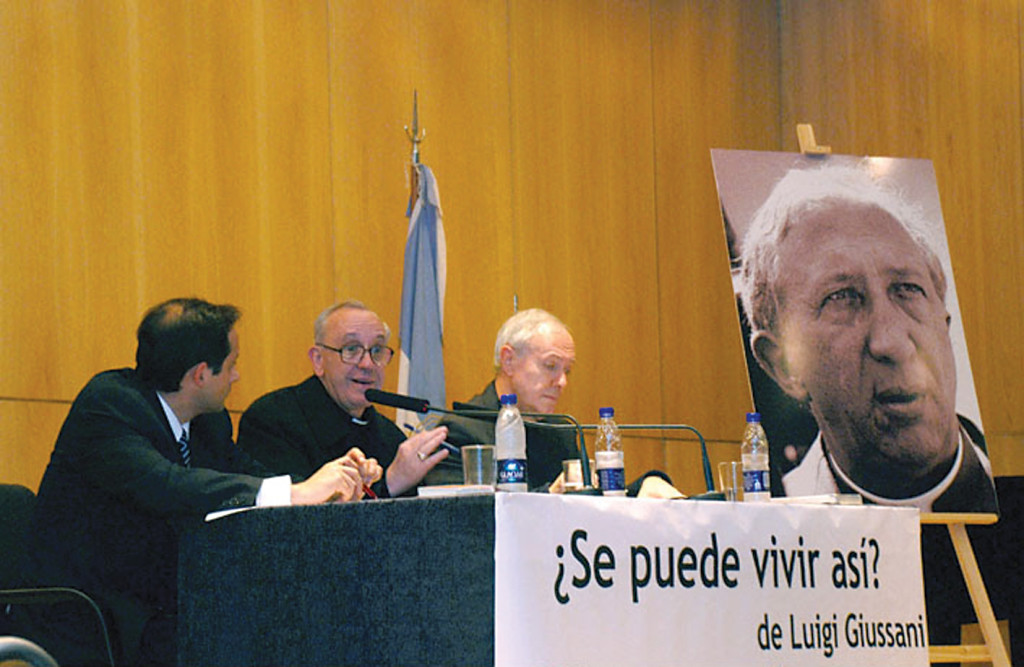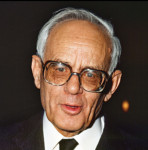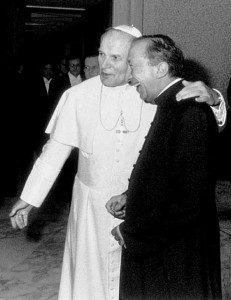Cardinal Jorge Mario Bergoglio never personally met Msgr. Luigi Giussani, but it is undeniable that, on a more ideal plane, this encounter did in fact occur. Bergoglio had the opportunity to present works by Giussani in Spanish four times in Buenos Aires: in 1999 El Sentido Religioso (The Religious Sense), in 2001 El atractivo de Jesucristo (The Appeal of Jesus Christ), in 2005 ¿Por qué la Iglesia? (Why the Church?), and in 2008 ¿Se puede vivir así? (Can We Live Like This?).

A large poster showing the face of the Italian priest and theologian, Msgr. Luigi Giussani, during a 2008 presentation of one of Giussani’s books, Can We Live Like This? in Buenos Aires, Argentina. Speaking in the center is the Cardinal Archbishop of Buenos Aires, Jorge Mario Bergoglio, the future Pope Francis.
As the cardinal confessed in 2001, two reasons led him to recognize in Giussani a kindred spirit. “The first, more personal, is the good that this man did me in the last decade, in my life as a priest, through reading his books and articles. The second reason: because I am convinced that his thought is deeply human and reaches even the most intimately held human yearnings. I would go so far as to say that it speaks about the deepest and at the same time the most understandable phenomenology, that of nostalgia, as a transcendental fact.” Bergoglio is referring here to the anthropological vision whose nucleus is found in The Religious Sense, a book by Giussani that Bergoglio presented in 1999.
“For many years,” he stated in his discussion of the text, “the writings of Msgr. Giussani have inspired my reflection […]. The Religious Sense is not a book for the exclusive use of those who are adherents of his movement; nor is it only for Christians or for believers. It is a book for all who take seriously their own humanity. I would say that today the most important issue that we must face is not so much the problem of God, the existence of God, the knowledge of God, but rather the problem of Man, the knowledge of Man, and finding within humanity itself the traces that God has left, so that he may be found. […] For a man who has forgotten or censured his fundamental questions and the yearnings of his heart, the act of speaking to him of God results in an abstract, esoteric discourse, or a devotion without any impact on life. We cannot go on with a discourse about God when we have not blown off the ashes that are covering the embers of these questions. The first task is to create the sense of the questions which are hidden, buried, weakened perhaps, yet present.” Here, Bergoglio’s words coincide, to the letter, with Giussani’s assertion: “The religious element constitutes the nature of our ‘I’ insofar as it is expressed in determinate questions: ‘What is the ultimate meaning of existence?’ ‘Why does pain exist, why death, why, in short, is life worth living?’”
This transcendental nostalgia undoubtedly reminded the then-cardinal of Buenos Aires, coming as he did from a Jesuit formation, of the transcendental anthropology developed by Karl Rahner. Nevertheless, the concurrences between Giussani and Rahner did not diminish their differences. Giussani had developed and articulated his notion of the “religious sense” in 1958, following the distinctive Thomistic focus of the Cardinal of Milan, Giovanni Battista Montini in his pastoral letter of 1957, On the Religious Sense. There the religious dimension is defined as vis appetitiva, as a requirement of truth, rather than a criteria for truth. In this way the “a priorist” risk which underlies Rahner’s focus, strongly dependent on Kantian transcendentalism, is avoided. This explains the importance that the category of the encounter acquires in Giussani. The encounter is the method in which the Mystery discernibly reaches man, touches him within space and time with signs that elicit a response. The encounter is the concrete means by which the religious sense passes from potency to act, from the latent to the manifest. In this way, the focus on the transcendent, the innate need for God inscribed a priori in our nature, does not eliminate the newness of the a posteriori, the unforeseeable means in which God’s action, grace, is manifested. Because of this, Bergoglio, always commenting on the Giussanian notion of the religious sense, states: “On the other hand, to stand in wonder before the signs requires a very human ability, the first that we possess as men and women, which is astonishment, the ability to be seized with wonder, as Giussani calls it; to have, ultimately, a child’s heart. Only astonishment can recognize them. […] The cultural opiate tends to annihilate, impair or kill this capacity for astonishment. The beginning of all philosophizing is wonder. There is a phrase of Msgr. Luigi, which says that the drama of contemporary Christianity resides in the fact that categories and norms are offered in place of astonishment at an event. And astonishment precedes all categories; it is what brings me to search, to open myself; it makes it possible for me to obtain a response, which is neither a verbal nor a conceptual response. Because if astonishment opens me as a question, the only answer is the encounter: only in the encounter is thirst quenched.”

An image showing young members of the Communion and Liberation movement about to leave Italy for Brazil in 1964.
Religious anthropology on the one hand, and the encounter as the means by which faith comes into existence, on the other, are the two poles which, as much for Giussani as for Bergoglio, indicate the crux of the question of Christianity today. Christianity does not manifest itself as a collection of precepts or values. “One does not begin to be Christian,” says Francis in his Evangelii gaudium, citing Benedict XVI, “through an ethical decision or a grand idea, but rather through the encounter with an event, a happening, a Person, which gives a new horizon to one’s life, and with it, a decisive orientation” (EG,7). Similarly, in his presentation of Giussani’s El atractivo de Jesucristo, Bergoglio states, “Everything in our lives, now as in the time of Jesus Christ, begins with an encounter. An encounter with this man, the carpenter of Nazareth, a man like all men but at the same time distinct. The first ones, John, Andrew, Simon, discovered that their innermost depths had been viewed, that their interior selves had been read, and in them arose an astonishment, a wonder, which, immediately, made them feel bound to him in a different way. […]
“This dynamic of the encounter, which causes astonishment and attachment and unites all faculties in harmony, cannot be understood, if it is not triggered [lit. ‘cocked’]—pardon the word—by compassion. Only one who has encountered compassion, who has been caressed by the tenderness of compassion, can truly encounter the Lord. […] The privileged place of this encounter is the caress of the mercy of Jesus Christ upon my very sin.” From this point, of complete harmony between Bergoglio and Giussani, a series of consequences of great importance may be derived.
The first is that grace precedes, that it comes before. In his presentation of El atractivo de Jesucristo, Bergoglio states, “The encounter is given. […] This is pure grace. Pure grace. In all of history, from the beginning until today, grace always comes first, is the antecedent [primerea], and everything else comes after. Giussani, in his book, refers to one of his articles published in 30 Days: “Algo que viene antes” (Something that Comes Before) (Issue #4, 1993). In El atractivo de Jesucristo he makes clear that, “‘What happens before’ is the encounter with Christ, even if not entirely accurately, even if not truly consciously. As it was with Andrew and John: something surprising, that they could not define. What happens before, grace, is the relationship with Christ: Christ is grace, the Presence of grace, and is your relationship with grace, your dialogue with it, your way of looking at it, of thinking about it, of concentrating upon it” (24).
The second consequence is that, if the encounter is the essential form in which faith is communicated, yesterday as it is today, then, in a world which has become, to a large extent, pagan, Christianity must be expressed in its essential form—and not primarily in terms of its ethical consequences—whose safeguard, in the public sphere, consists of lay Christians involved on the “temporal plane.” Giussani, already in the methodological text Reflexiones sobre una experiencia (Reflexions on an Experience) (1959), calls for a “simple and essential” Christian reaffirmation, because “the Church is very moderate in setting obligatory points,” and in 1982 (Hombres sin patria) (Men Without a Homeland) states that, “while Christianity consists of sustaining a dialectic as well as, in practice, Christian values, it finds common ground and welcome in all places.”
Pope Francis, for his part, said in his interview with Father Antonio Spadaro (August 2013): “The teachings of the Church, whether dogmatic or moral, are not all equivalent. A pastoral mission does not obsess itself with transmitting in a disorganized way a set of doctrines in order to impose them insistently. A mission statement concentrates on the essential, the necessary, which is at the same time that which most attracts and inspires, which inflames the heart, as in the disciples of Emmaus. We have, therefore, to find a new equilibrium, because otherwise the moral edifice of the Church runs the risk of crumbling like a house of cards, of losing the freshness and fragrance of the Gospel. The evangelical proposal must be simpler, deeper, and more radiant. Only from this proposal can emerge, later on, the moral consequences.” The appeal of Jesus Christ, a term taken up again in Evangelii gaudium (n. 39), must precede moral doctrine. It precedes it insofar as it proceeds from the encounter, and cannot be verified apart from this. It is a focus that precludes, from the beginning, any type of Christian fundamentalism.
The third and final consequence that Bergoglio and Giussani hold in common is their judgment of the dangers that contemporary Christianity must confront: Gnosticism and Pelagianism. If Christianity is an Event that is made manifest in an encounter, historical and observable, if it comes before [primerea] with respect to whatever action or intention of our own, then the spiritual hollowing of the Christian reality, the negation of its having been made flesh [as in Gnosticism] as well as the moralist pretension of being able to constitute by ourselves this new world [as in Pelagianism], become deviations that must be corrected. As Bergoglio stated in 2001: “This authentically Christian conception of morality that Giussani presents has nothing to do with the spiritualist Quietisms of those who are currently filling the shelves of the Christian bookstores. Delusions. Nor with the Pelagianism so in fashion, in its many and sophisticated manifestations. Pelagianism, at its root, is rebuilding the tower of Babel. Spiritualist Quietisms are vigorous prayerful or inner spiritual exertions that never go beyond simply affirming.”
In both cases a process of “mundanization” of faith is discussed. Evangelii gaudium states, “This mundanity can grow especially in two closely related ways. One is the fascination with Gnosticism, a faith enclosed in subjectivism, where only a definite experience or a chain of reasoning and understanding that supposedly reinforces and illuminates is of interest, while in fact the subject remains enclosed in the inwardness of his own reasoning or his own feelings. The other is the self-referential and Promethean Neo-Pelagianism of those who, ultimately, only trust in their own power and feel superior to others for complying with certain customs or for being unswervingly faithful to their own certain Catholic style of the past. It is an assumed doctrinal or disciplinary security that leads to a narcissistic and authoritarian elitism, where instead of evangelization what is done is analysis and classification of others, and instead of facilitating access to grace, energies are spent in exerting control. In both cases, neither Jesus Christ nor one’s neighbor are truly of interest. They are manifestations of an anthropocentric inwardism [inmanentismo]. It is not possible to imagine that these distorted forms of Christianity can bring forth an authentic evangelizing dynamism” (EG, 94).
In this case it is interesting to note that the form of Neo-Pelagianism that is found today is no longer that which predominated in the 1970s, typical of the Christian political theology influenced by Marxism, but rather a new form, of the right, characteristic of a certain type of Catholic traditionalism. In any case, what is essential, in the ideal encounter between Bergoglio and Giussani, is the fundamental harmony. Gnosis and Pelagianism are the dangers, because Christianity is a real Event that continues in history, and this Event is the (free) source of the new humanity that cannot be generated by man alone. What Giussani has insistently emphasized throughout his educative testimony thus finds in Bergoglio its own and ideal continuity.






Facebook Comments